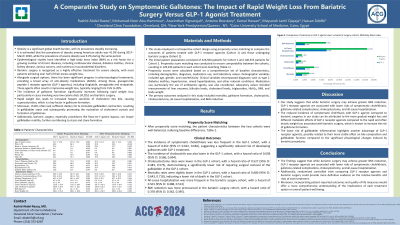Tuesday Poster Session
Category: Obesity
P4876 - A Comparative Study on Symptomatic Gallstones: The Impact of Rapid Weight Loss From Bariatric Surgery Versus GLP-1 Agonist Treatment
Tuesday, October 29, 2024
10:30 AM - 4:00 PM ET
Location: Exhibit Hall E

Has Audio

Rashid Abdel-Razeq, MD
Cleveland Clinic
Cleveland, OH
Presenting Author(s)
Rashid Abdel-Razeq, MD1, Mohamad-Noor Abu-Hammour, MD2, Aravinthan Vignarajah, MD3, Antoine Boustany, MD3, Kamal Hassan, MD4, Maysarah Jamil. Qapaja, MS5, Hassan Siddiki, MD6
1Cleveland Clinic, Cleveland, OH; 2Cleveland Clinic Fairview, Cleveland, OH; 3Cleveland Clinic Foundation, Cleveland, OH; 4New York-Presbyterian/Queens, New York, NY; 5Cairo University School of Medicine, Cairo, Al Jizah, Egypt; 6Digestive Disease Institute, Cleveland Clinic, Cleveland, OH
Introduction: Rapid weight loss is a known risk factor for the development of gallstones. Bariatric surgery and the use of glucagon-like peptide-1 (GLP-1) agonists, such as liraglutide and semaglutide, are effective interventions for achieving rapid weight reduction in obese patients. However, the comparative risk of gallstone formation following these two weight-loss methods remains unclear. This study aims to evaluate and compare the incidence of symptomatic gallstones in patients undergoing bariatric surgery versus those using GLP-1 agonists.
Methods: A retrospective cohort study was conducted using data from the TriNetX network. The study population include patients who have been prescribed GLP-1 agonists (Cohort-1) or have undergone bariatric surgery for weight loss (Cohort-2). Patients included were followed for up to two years post-intervention to identify the incidence of gallstones. Relevant variables were extracted and analyzed to compare the outcomes between the two cohorts.
Results: Data analyzed was obtained from 120 health care organizations included in the Global Collaborative Network. Cohort-1 patients were extracted from 426,500 patients who matched the query criteria (age ≥18 years, BMI ≥ 35 kg/m2, on GLP-1 agonists, but never had a bariatric surgery). Cohort-2 patients were extracted from a total of 140,553 similar patients who had a bariatric surgery, but never treated with GLP-1 agonists. Propensity score matching was performed on all characteristics and a total of 129,234 participant were identified in each cohort. Gallstones were diagnosed in 2,780 (2.15%) in GLP-1 users and in 5,512 (4.27%) following bariatric surgery, Hazard Ratio (HR)=0.652, (95%CI 0.622,0.682), p< 0.001. Cholecystitis was also less frequent in GLP-1 cohort (n=811, 0.63%) compared to cohort-2 (n=1,662, 1.29%), HR=0.638 (95%CI 0.586,0.694), p< 0.001. A total of 726 (0.56%) patients underwent cholecystectomy in cohort-1 compared to 1,821(1.4%) in cohort-2, HR=0.527 (95%CI 0.483,0.575), p< 0.001.
Discussion: Patients undergoing rapid weight reduction utilizing bariatric surgery are at higher risk for gallstones, cholecystitis and cholecystectomy compared to those utilize GLP-1 agonists for the same purpose.
Disclosures:
Rashid Abdel-Razeq, MD1, Mohamad-Noor Abu-Hammour, MD2, Aravinthan Vignarajah, MD3, Antoine Boustany, MD3, Kamal Hassan, MD4, Maysarah Jamil. Qapaja, MS5, Hassan Siddiki, MD6. P4876 - A Comparative Study on Symptomatic Gallstones: The Impact of Rapid Weight Loss From Bariatric Surgery Versus GLP-1 Agonist Treatment, ACG 2024 Annual Scientific Meeting Abstracts. Philadelphia, PA: American College of Gastroenterology.
1Cleveland Clinic, Cleveland, OH; 2Cleveland Clinic Fairview, Cleveland, OH; 3Cleveland Clinic Foundation, Cleveland, OH; 4New York-Presbyterian/Queens, New York, NY; 5Cairo University School of Medicine, Cairo, Al Jizah, Egypt; 6Digestive Disease Institute, Cleveland Clinic, Cleveland, OH
Introduction: Rapid weight loss is a known risk factor for the development of gallstones. Bariatric surgery and the use of glucagon-like peptide-1 (GLP-1) agonists, such as liraglutide and semaglutide, are effective interventions for achieving rapid weight reduction in obese patients. However, the comparative risk of gallstone formation following these two weight-loss methods remains unclear. This study aims to evaluate and compare the incidence of symptomatic gallstones in patients undergoing bariatric surgery versus those using GLP-1 agonists.
Methods: A retrospective cohort study was conducted using data from the TriNetX network. The study population include patients who have been prescribed GLP-1 agonists (Cohort-1) or have undergone bariatric surgery for weight loss (Cohort-2). Patients included were followed for up to two years post-intervention to identify the incidence of gallstones. Relevant variables were extracted and analyzed to compare the outcomes between the two cohorts.
Results: Data analyzed was obtained from 120 health care organizations included in the Global Collaborative Network. Cohort-1 patients were extracted from 426,500 patients who matched the query criteria (age ≥18 years, BMI ≥ 35 kg/m2, on GLP-1 agonists, but never had a bariatric surgery). Cohort-2 patients were extracted from a total of 140,553 similar patients who had a bariatric surgery, but never treated with GLP-1 agonists. Propensity score matching was performed on all characteristics and a total of 129,234 participant were identified in each cohort. Gallstones were diagnosed in 2,780 (2.15%) in GLP-1 users and in 5,512 (4.27%) following bariatric surgery, Hazard Ratio (HR)=0.652, (95%CI 0.622,0.682), p< 0.001. Cholecystitis was also less frequent in GLP-1 cohort (n=811, 0.63%) compared to cohort-2 (n=1,662, 1.29%), HR=0.638 (95%CI 0.586,0.694), p< 0.001. A total of 726 (0.56%) patients underwent cholecystectomy in cohort-1 compared to 1,821(1.4%) in cohort-2, HR=0.527 (95%CI 0.483,0.575), p< 0.001.
Discussion: Patients undergoing rapid weight reduction utilizing bariatric surgery are at higher risk for gallstones, cholecystitis and cholecystectomy compared to those utilize GLP-1 agonists for the same purpose.
Disclosures:
Rashid Abdel-Razeq indicated no relevant financial relationships.
Mohamad-Noor Abu-Hammour indicated no relevant financial relationships.
Aravinthan Vignarajah indicated no relevant financial relationships.
Antoine Boustany indicated no relevant financial relationships.
Kamal Hassan indicated no relevant financial relationships.
Maysarah Qapaja indicated no relevant financial relationships.
Hassan Siddiki: Boston Scientific consulting – Consultant.
Rashid Abdel-Razeq, MD1, Mohamad-Noor Abu-Hammour, MD2, Aravinthan Vignarajah, MD3, Antoine Boustany, MD3, Kamal Hassan, MD4, Maysarah Jamil. Qapaja, MS5, Hassan Siddiki, MD6. P4876 - A Comparative Study on Symptomatic Gallstones: The Impact of Rapid Weight Loss From Bariatric Surgery Versus GLP-1 Agonist Treatment, ACG 2024 Annual Scientific Meeting Abstracts. Philadelphia, PA: American College of Gastroenterology.
